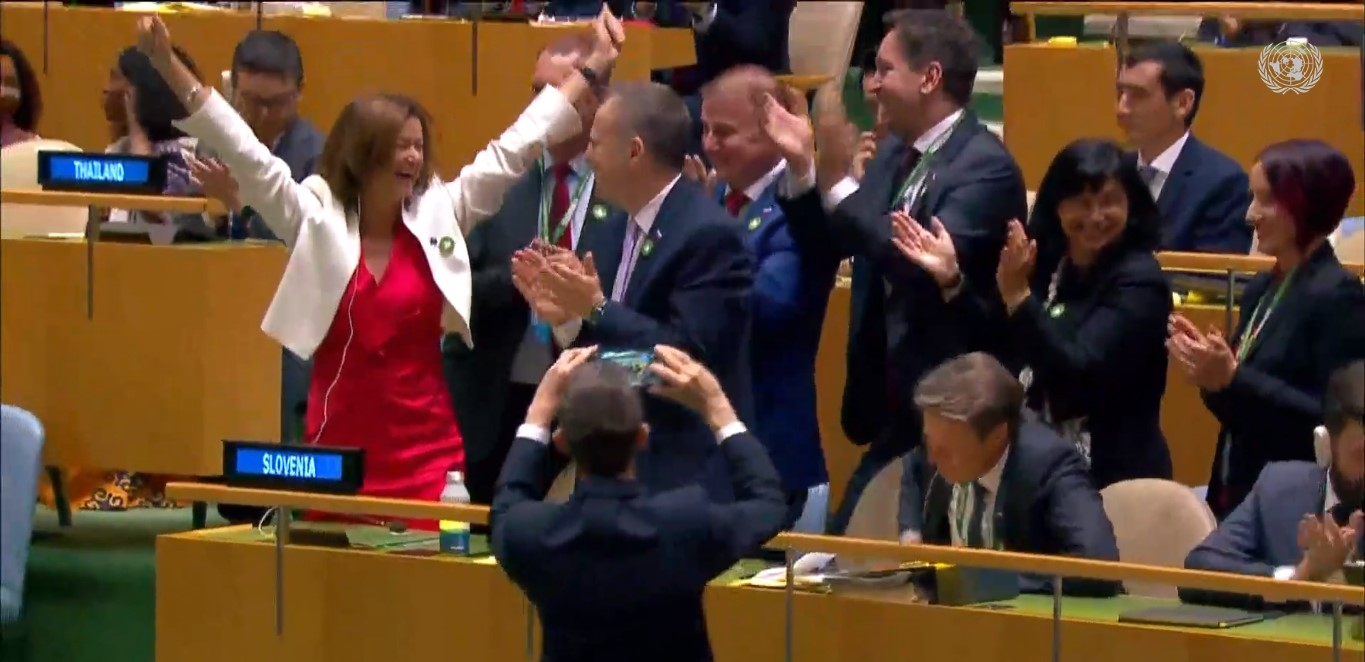The regime fails to be elected to the UN Security Council and blames “the collective West”
 The situation has not changed
The situation has not changed

Against a background of Russian plans to deploy nuclear weapons in Belarus in July, Minsk loses to Slovenia in the election of non-permanent UN Security Council members, by 153 votes to 38. The result reflects the international view of Belarus’ as a source of challenges and threats, incompatible with such status.
Putin’s announcement about commencing the deployment of nuclear weapons to Belarus from July 7th attracted expected criticism from Western countries. The United States called the Russian plan reckless and irresponsible and stated that it would continue to monitor the situation. Washington does not yet see signs of redeployment of nuclear assets or an imminent risk of nuclear war within Ukraine or on the continent.
The Belarusian parliament characterised this step as a continuation of the peace-loving policy of Belarus within the framework of the new Constitution.
Meanwhile, Belarus lost the election of non-permanent members of the UN Security Council for 2024-2025 to Slovenia by 38 votes to 153. Minsk expressed disappointment and accused the “collective West” of putting pressure on other countries to vote for Slovenia.
Democratic forces in exile observed that the result is a consequence of how the international community views the human rights and international law violations of the Lukashenka regime, and its support for armed aggression against Ukraine. The effects of these acts are felt by Belarusians and neighbouring countries, with a detrimental effect on global interests.
According to Sviatlana Tsikhanouskaya, the result is an indictment of the Lukashenka regime’s ability to be a responsible international partner. Further, the deployment of nuclear weapons in Belarus takes place immediately prior to the July NATO summit in Vilnius. Tsikhanouskaya believes that this crude intimidation and an attempt to force Europe to comply. She calls for the punishment of the Russian and Belarusian dictators for nuclear blackmail.
At the 111th session of the International Labour Organisation (ILO) on June 5th, the EU delegation supported a draft resolution on measures to force Belarus to comply with the norms of Conventions 87 (on freedom of association) and 98 (on the right to organize and collective bargaining). The draft resolution proposes regular discussion of the Belarusian issue until it is established that the Minsk authorities have fulfilled their convention obligations. Governments, representatives of employers and workers from ILO member countries are invited to reconsider their relations with the Belarusian authorities. The draft “urges” the Belarusian authorities to speedily approve an ILO mission to study how the recommendations are being implemented. The mission experts will also require access to representatives of independent trade unions in captivity.
The Federation of Trade Unions of Belarus said that the West understands that it is losing the sanctions war waged against Belarus, and are exploiting the ILO platform to justify their illegal actions and draw other countries into their dirty game.
Meanwhile, the UK imposed new sanctions against the Lukashenka regime related to Minsk’s support for Moscow in the war against Ukraine. The new package includes a ban on the import of gold, cement, wood and rubber from Belarus and blocking the export to Belarus of banknotes, industrial equipment, and goods, technologies and materials that could be used to produce chemical and biological weapons. The UK government will take action against the spread of propaganda by Belarusian media companies – this means that companies operating in social networks, and Internet providers will restrict access to the websites of sanctioned Belarusian media, as has already been done with Russian ones. London has also expanded the criteria for inclusion in the sanctions list of Belarus – not only citizens of Belarus who support the regime, but also their relatives can fall under sanctions.
Lithuanian Foreign Minister Gabrielius Landsbergis, in a letter to the Prosecutor of the International Criminal Court (ICC) Karim Ahmad Khan, pointed out the need to assess the role of Belarus in helping Russia achieve justice and accountability for war crimes against Ukraine.
Subscribe to our newsletter




Situation in Belarus
Constitutional referendum: main consequences


 Video
Video
How to count the political prisoners: are the new criteria needed?


 Video
Video
Paternalism In Decline, Belarusian Euroscepticism, And The Influence Of Russia


 Video
Video












